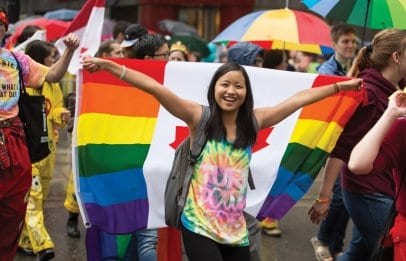Politics and partying — that is what is at the heart of Pride, even if they often only hold an uneasy truce.
No where is that more apparent than the annual Pride parade. On a rainy and grey June 28, 2015, the three-hour parade wound it’s way down Yonge Street, and along with it came political groups of every stripe: labour unions, corporations, NGOs, and anyone else who had the wherewithal to form a group and make a banner.
The parade has become an essential stop for most politicians. In a federal election year, it even takes on the appearance of a campaign stop. Justin Trudeau, who walked with his Liberal contingent, was mobbed for selfies at the end of the parade and he happily stopped for each one.
Thomas Mulcair, who did a number of media interviews before the parade, rode the NDP float and Green Party leader Elizabeth May led a contingent carrying a massive, flapping, green flag.
Stephen Harper was, once again, a no-show.
Many years ago it was a struggle to get any politicians to march in the parade. The first Toronto mayor to do so was Barbara Hall in 1995. And Rob Ford, Toronto’s mayor from 2010 to 2014, never walked in the parade.
This year, however, Mayor John Tory walked in the parade, along with what Councillor Shelley Carroll said was the biggest contingent of city councillors ever to participate. Michael Ford, current Toronto District School Board trustee and Rob Ford’s nephew, marched in the parade as well.


The Pride Parade welcomes just about anyone — excepting those groups who came out on the losing side of Pride Toronto’s dispute resolution process.
That includes some groups who have fraught histories with the LGBT community. Police have marched in the parade for several years now as well as other law enforcement agencies. This year, corrections officers marched — along with a large, white, inmate transfer bus.
“We’re trying very hard to make things work for everybody,” said Jennifer Chamberlain, an operational manager at Central East Correctional Centre, when Daily Xtra asked how she would respond to people who may be concerned that the group was marching in the parade today. “And we’re very proud of where we work and proud of what we do. It’s for the public.”
And before and after the politicians, came a small army of corporate sponsors. Pfizer floated a giant Viagra balloon down Yonge Street, and representatives from budget shopping giants Winners and Marshalls tossed rainbow flags into the crowd.
Grassroots organizations were still well represented — several smaller political parties walked, along with organizations like Toronto Gaymers and OUTlaws.
On Church Street, about 10 people protested at the TD festival booth at Yonge and Wellesley for 45 minutes after the parade. Abuzar Chaudhary, one of the organizers of the protest, said she wanted to send a message that Pride is not about a corporation. “Pride needs to go back to the grassroots and actually be first and foremost about the issues, and not so much about the advertising.”
Many of the onlookers seemed more interested in the protest as spectacle, posing for photos in front of the activists. Here, it was clear to see how many people view Pride parade day as a sort of cultural tourism — one day to come down to Toronto’s gaybourhood and gawk at people in costumes or in the nude.
It’s a growing pain that while frustrating, is not surprising in a society that it is still evolving in its views on LGBT rights. There have been many advancements this year alone, yet Pride Toronto’s executive director says he still gets hate mail, and people still protest en masse against updating the province’s sex-ed curriculum.
However — Toronto’s Pride celebrations continue to act as a beacon for many around the world who are fighting to assert their own rights. Pussy Riot’s Nadezhda Tolokonnikova, one of the parade’s international grand marshals, took to the stage at Yonge Dundas Square after the parade and explained the repression she and Pussy Riot face in Russia, and their activism.
Tolokonnikova told the Huffington Post that she hopes to one day see Pride parades like Toronto’s in her own country.


 Why you can trust Xtra
Why you can trust Xtra


